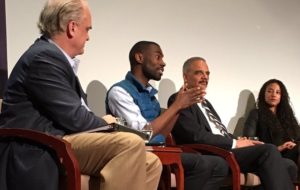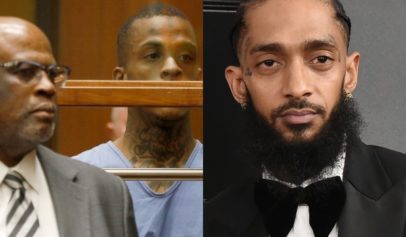
(From left) Miller Center Director of Public Programs Douglas Blackmon, activist DeRay McKesson, former U.S. Attorney General Eric Holder and Harvard professor Dr. Elizabeth Hinton were on the panel at a discussion, titled “Race: The American Cauldron,” held recently a the Carter Center.
For decades, there has been a public discussion about the extent to which social problems in the Black community are a direct result of “deficiencies” within Black culture. Some racist scientists have even gone so far as to suggest that such problems could have a genetic link. But, whether the issue of Black “deficiencies” is raised by those with explicitly hostile motives or by individuals honestly struggling to solve complicated social problems, the language used can lead to harmful consequences.
Recently, the topic came up during a panel discussion on race that was sponsored by the University of Virginia’s Miller Center of Public Affairs and hosted by the Carter Center in Atlanta. The discussion, titled “Race: The American Cauldron,” featured a panel that included former Attorney General Eric Holder, Prof. Michael Eric Dyson, Prof. Elizabeth Hinton, Black Lives Matter activist DeRay McKesson and DeKalb County’s Public Safety Director Cedric Alexander. The event also featured an appearance by Sally Yates, the interim Attorney General who refused to enforce Trump’s immigration ban and was subsequently fired. She received a standing ovation from the audience.
One of the most interesting exchanges was between Holder and Dyson, and it stemmed from an audience member’s question regarding Holder’s reference to “social pathology” in the Black community. (Holder’s actual phrase may have been “social dysfunction.”) While the question was directed at Holder, it was implicitly connected to President Obama’s pattern of challenging the Black community, particularly “Cousin Pookie” who always seems to be sitting on the couch.
Holder began his answer by conceding that language is important and by affirming the ongoing impact of racism. However, he defended remarks that both he and President Obama had previously made, stating:
We have to acknowledge that there are things within minority communities that we have to own. And it doesn’t mean that I don’t love my people. … It doesn’t mean I’m not acknowledging the impact of race. But people are making conscious decisions that have to be held out as negative decisions that have a negative impact on the very communities in which we live. And unless we own that, and own the fact that we can change that, we don’t get to a better place.
In response, Dyson agreed with Holder regarding the need for “a self-inventory that permits people to be reflective about the particular problems that arise in their community.” But, he challenged the notion that there was somehow a lack of that among Black people. “Go to any church on Sunday morning. … Black people have conservative moral values. But, when you excoriate them in public, you pretend as if they don’t.”
Moreover, Dyson argued that Obama often demonstrated a double standard, reserving lectures on personal responsibility for Black audiences but exempting other groups from such advice. He stated that, although Obama felt comfortable speaking at Morehouse College and treating “those young men as if they are graduating from a detention center as opposed to college,” he did not go to the all-women Barnard College to tell predominantly white women not to use sexism as “an excuse.”
Prof. Elizabeth Hinton then expanded on how such language and theories had implications on public policy during the administrations of Lyndon Johnson, Richard Nixon and beyond. The concept that Black poverty was a function of Black culture suggested there was no need for “a major structural intervention” and that, instead, the best the federal government could offer was “benign neglect.” Hinton explained:
In the absence of major structural changes and a massive infusion of resources that the Kerner Commission recommended to the Johnson administration in 1968, the problems of poverty remained and indeed worsened when the federal government disinvests from social welfare programs and really puts police forces as kind of, by the end of the 80s, the primary public service institutions in low-income communities. … I think it’s really time for new discussions and a turn away from this idea that pathology explains conditions in low-income Black communities.
But far from turning away from such ideas, the current political reality of Republican-controlled government suggests that notions of cultural pathology and the policies that flow from such notions are about to see a rebirth. Three years ago, Speaker of the House Paul Ryan was caught in a controversy when he made the following remarks on a conservative talk show:
We have got this tailspin of culture, in our inner cities in particular, of men not working and just generations of men not even thinking about working or learning the value and the culture of work, and so there is a real culture problem here that has to be dealt with.
Although he later tried to explain away the comments, his perspective was quite clear. And with control of both houses of Congress and Trump in the White House, he now has carte blanche to push through his modern-day version of “benign neglect,” which essentially involves dismantling the nation’s social safety-net programs.
As destructive as such a policy strategy would be, what’s far more ominous is the linkage between pathology language and law enforcement policies. Trump and his advisers have had an obsession with the Black community and crime for some time. For years, the Breitbart website that was previously managed by Trump adviser Steve Bannon has featured articles linking the Black community with crime, and Trump himself not only famously tweeted false statistics regarding Black crime during his campaign, he often lied about such statistics during his actual campaign speeches.
Then there was the Rudy Giuliani “Face the Nation” interview in which he argued that instead of worrying so much about police violence, Black families should teach their children that “the real danger to them is not the police, the real danger to them … are other Black kids who are going to kill them.”
And of course, more recently, there has been Trump’s references to “American carnage” and murders in Chicago, which in spite of Trump’s repeated false claims, is not even in the top 10 of major cities in regards to its murder rate over the past five years (although any number of murders is too high). Trump has even threatened to “send in the feds” if the city does not solve its crime problem, because after all, once you have spread the propaganda that such crime is the result of inherent cultural, or even genetic, deficiencies, then it becomes acceptable to take extreme measures to “eliminate” the problem.
Similar rationales were used when Europeans invaded and colonized the African continent.


